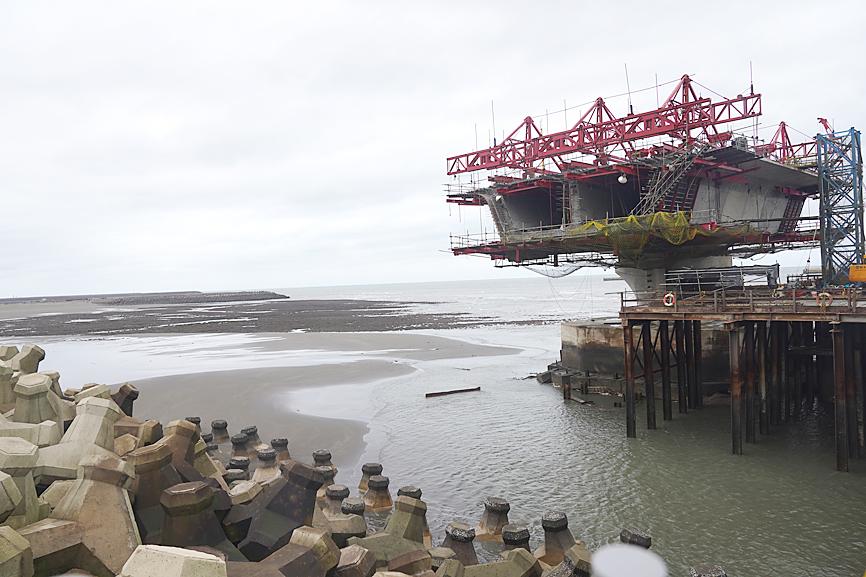Taiwanese yesterday voted against relocating a liquefied natural gas (LNG) terminal project from its planned site by 51.6 percent to 48.4 percent, a result that would alleviate the government’s concerns of meeting its 2025 goal of phasing out nuclear power.
Official results showed that 4,163,464 people voted against and 3,901,171 voted in favor.
The electorate was asked to vote on whether Taiwan’s third LNG terminal project should be relocated from its planned site near algal reefs off Taoyuan’s Guanyin District (觀音).

Photo: CNA
For a referendum to pass, the number of votes in favor must reach 4.95 million, one-quarter of the total number of eligible votes, and be higher than the number of votes cast against the question.
A total of 19.82 million people were eligible to vote, but the turnout was just 41.09 percent, the commission said.
Environmentalist Pan Chong-cheng (潘忠政), who initiated the referendum, told a news conference in Taipei that he and supporters of relocating the terminal project were disappointed in the result, but would accept it.
“We cannot lose heart over the result, as there is still plenty of work for us to do to continue protecting the algal reefs,” he said.
Groups seeking to protect the reefs would focus on the outcome of an environmental impact assessment of the project and whether CPC Corp, Taiwan would honor its promise to avoid damaging the reefs, Pan said.
Pan attributed the referendum’s failure to the government, saying that some information spread by officials was false.
He said that the referendum was not intended to halt construction of the terminal, but to relocate the project, Pan said.
“We gained widespread support among young people when collecting signatures, but today the ratio of young people who voted in the referendum is much lower than expected... Why? I think some of them received false information, could not make up their mind and chose not to vote,” Pan said.
The government worked hard to encourage people to vote against the referendum questions, and “environmental groups could not compete with the government,” he said.
The Ministry of Economic Affairs, which oversees the state-run project, said in a statement that the referendum results show that most Taiwanese approve of the government’s energy plans.
The ministry would require CPC to consider ecological protection in constructing the terminal, it said.
CPC failed its first environmental impact assessment in October, but corrected the issues the review committee said were unsatisfactory, and it would apply for a second assessment as soon as possible, CPC spokesman Chang Ray-chung (張瑞宗) said.
While the question was initiated as the nation’s first referendum focused on environmental protection, it became a political battlefield — with the Democratic Progressive Party (DPP) concerned that the government’s energy plans would be compromised if the project was forced to relocate, while the Chinese Nationalist Party (KMT) favored the referendum as a means of criticizing the DPP’s performance.
The ministry said that construction of the terminal is essential to the nation’s energy security, as the government plans to generate more power by burning natural gas, as the two other terminals have been running at full capacity.
Aiming to phase out nuclear power by 2025, the government plans to replace nuclear power with natural gas and green energy, raising the ratio of power generated by burning natural gas to 50 percent, the ministry said.

Alain Robert, known as the "French Spider-Man," praised Alex Honnold as exceptionally well-prepared after the US climber completed a free solo ascent of Taipei 101 yesterday. Robert said Honnold's ascent of the 508m-tall skyscraper in just more than one-and-a-half hours without using safety ropes or equipment was a remarkable achievement. "This is my life," he said in an interview conducted in French, adding that he liked the feeling of being "on the edge of danger." The 63-year-old Frenchman climbed Taipei 101 using ropes in December 2004, taking about four hours to reach the top. On a one-to-10 scale of difficulty, Robert said Taipei 101

Nipah virus infection is to be officially listed as a category 5 notifiable infectious disease in Taiwan in March, while clinical treatment guidelines are being formulated, the Centers for Disease Control (CDC) said yesterday. With Nipah infections being reported in other countries and considering its relatively high fatality rate, the centers on Jan. 16 announced that it would be listed as a notifiable infectious disease to bolster the nation’s systematic early warning system and increase public awareness, the CDC said. Bangladesh reported four fatal cases last year in separate districts, with three linked to raw date palm sap consumption, CDC Epidemic Intelligence

Taiwanese and US defense groups are collaborating to introduce deployable, semi-autonomous manufacturing systems for drones and components in a boost to the nation’s supply chain resilience. Taiwan’s G-Tech Optroelectronics Corp subsidiary GTOC and the US’ Aerkomm Inc on Friday announced an agreement with fellow US-based Firestorm Lab to adopt the latter’s xCell, a technology featuring 3D printers fitted in 6.1m container units. The systems enable aerial platforms and parts to be produced in high volumes from dispersed nodes capable of rapid redeployment, to minimize the risk of enemy strikes and to meet field requirements, they said. Firestorm chief technology officer Ian Muceus said

MORE FALL: An investigation into one of Xi’s key cronies, part of a broader ‘anti-corruption’ drive, indicates that he might have a deep distrust in the military, an expert said China’s latest military purge underscores systemic risks in its shift from collective leadership to sole rule under Chinese President Xi Jinping (習近平), and could disrupt its chain of command and military capabilities, a national security official said yesterday. If decisionmaking within the Chinese Communist Party has become “irrational” under one-man rule, the Taiwan Strait and the regional situation must be approached with extreme caution, given unforeseen risks, they added. The anonymous official made the remarks as China’s Central Military Commission Vice Chairman Zhang Youxia (張又俠) and Joint Staff Department Chief of Staff Liu Zhenli (劉振立) were reportedly being investigated for suspected “serious